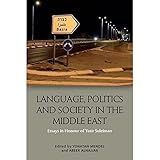Language, Politics and Society in the Middle East : Essays in Honour of Yasir Suleiman / Yonatan Mendel, Abeer AlNajjar.
Material type: TextPublisher: Edinburgh : Edinburgh University Press, [2022]Copyright date: ©2018Description: 1 online resource (256 p.) : 4 B/W tables 2 B/W line artContent type:
TextPublisher: Edinburgh : Edinburgh University Press, [2022]Copyright date: ©2018Description: 1 online resource (256 p.) : 4 B/W tables 2 B/W line artContent type: - 9781474421539
- 9781474421546
- 306.440956 23/eng
- P40.4.M628 L363 2018
- P40.4.M628 L363 2018
- online - DeGruyter
| Item type | Current library | Call number | URL | Status | Notes | Barcode | |
|---|---|---|---|---|---|---|---|
 eBook
eBook
|
Biblioteca "Angelicum" Pont. Univ. S.Tommaso d'Aquino Nuvola online | online - DeGruyter (Browse shelf(Opens below)) | Online access | Not for loan (Accesso limitato) | Accesso per gli utenti autorizzati / Access for authorized users | (dgr)9781474421546 |
Frontmatter -- Contents -- Figures and Tables -- Acknowledgements -- Foreword: About Professor Yasir Suleiman -- Introduction: Words, Language, Message -- 1. The Hauntology of Language and Identity -- 2. Transcultural Content and Translingual Refl ection: Rethinking the Arabic Language Learning Experience -- 3. Metaphorical Recurrence and Language Symbolism in Arabic Metalanguage Discourse -- 4. Colloquial Moroccan Arabic: Shifts in Usage and Attitudes in the Era of Computer-mediated Communication -- 5. ‘Arabic is Under Threat’: Language Anxiety as a Discourse on Identity and Confl ict -- 6. Code Choice, Place and Identity in Egypt: Evidence from Two Novels -- 7. Language as Proxy in Egypt’s Identity Politics: Examining the New Wave of Egyptian Nationalism -- 8. Rakākah and the Petit Quarrel of 1871: Christian Authors and the Competition over Arabic -- 9. Orchestrating Multimodal Protest and Subverting Banal Nationalism in the Linguistic Landscape of the Tunisian Revolution -- 10. The Arab Jews and the Arabic Language in Israel: An Ongoing Ambivalence between Positive Nostalgia and Negative Present -- 11. War Names in the Arab–Israeli Confl ict: A Comparative Study -- About the Contributors -- Index
restricted access online access with authorization star
http://purl.org/coar/access_right/c_16ec
Explores the dynamic relationships between language, politics and society in the Middle EastPublished in honour of Professor Yasir Suleiman, this collection acknowledges his contribution to the field of language and society in general, and to that of language analysis of socio-political realities in the Middle East in particular. Presenting a range of case studies relating to the role of language in the Middle East, each shows that the study of language unearths deeper processes relating to political affiliations, social behaviour and transnational as well as religious and sectarian identities. It also explores questions related to the power of language as a socio-political instrument, and addresses current issues that facilitate an understanding of the evolving intersections in the areas of language and politics in the modern Middle East. This includes how language forms and is shaped by its social and political surroundings, the language manifestations of social, religious and political identifications, as well as groupings, divisions and polarisations in the encounter between language, conflict and politics in contemporary Middle Eastern communities. Looking at language as a proxy for social and political struggles, the volume gives prominence to the long-lasting legacy and great contribution of Professor Yasir Suleiman to the field.Key FeaturesBrings together scholars from the fields of sociology, political science, Middle Eastern history, linguistics, sociolinguistics, political communication and media studiesIncludes chapters on identity changes via literary creations and word choice, code-switching and its importance in understanding political realities; Arabic studies in Jewish schools in Israel; the influence of the dominant Hebrew on Arabic spoken by Palestinians in Israel, and ‘the language of the revolution’ with case studies from Tunisia, Egypt and LibyaContributorsAshraf Abdelhay, Clare Hall College, CambridgeMariam Aboelezz, Lancaster UniversityMuhammad Amara, Beit Berl Academic CollegeReem Bassiouney, The American University of CairoMaisalon Dallashi, Tel Aviv UniversityEirlys E. Davies, King Fahd School of Translation, Tangier Carole Hillenbrand, University of St Andrews and University of EdinburghRana Issa, University of OsloJohn E. Joseph, University of Edinburgh Chaoqun Lian, Peking University and University of CambridgeSinfree Makoni, Pennsylvania State UniversityKarin Christina Ryding, Georgetown UniversitySonia Shiri, University of Arizona
Mode of access: Internet via World Wide Web.
In English.
Description based on online resource; title from PDF title page (publisher's Web site, viewed 29. Jun 2022)


